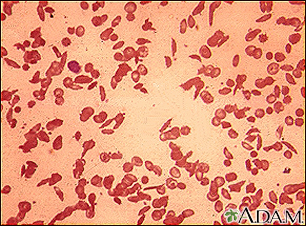Sickle cell test
Sickledex; Hgb S test
The sickle cell test looks for the abnormal hemoglobin in the blood that causes the disorder sickle cell disease.
Images




How the Test is Performed
A blood sample is needed.
How the Test will Feel
When the needle is inserted to draw blood, some people feel moderate pain. Others feel only a prick or stinging. Afterward, there may be some throbbing or a bruise. This soon goes away.
Why the Test is Performed
This test is done to tell if a person has abnormal hemoglobin that causes sickle cell disease and sickle cell trait. Hemoglobin is a protein in red blood cells that carries oxygen.
In sickle cell disease, a person has two abnormal hemoglobin S genes. A person with sickle cell trait has only one of these abnormal genes and no symptoms, or only mild ones.
This test does not tell the difference between these two conditions. Another test, called hemoglobin electrophoresis, will be done to tell which condition someone has.
Normal Results
A normal test result is called a negative result.
Normal value ranges may vary slightly among different laboratories. Some labs use different measurements or test different samples. Talk to your health care provider about the meaning of your specific test results.
What Abnormal Results Mean
An abnormal test result indicates the person might have one of these:
- Sickle cell disease
- Sickle cell trait
Iron deficiency or blood transfusions within the past 3 months can cause a false negative result. This means the person might have the abnormal hemoglobin for sickle cell, but these other factors are making their test results appear negative (normal).
Risks
There is little risk involved with having your blood taken. Veins and arteries vary in size from one person to another, and from one side of the body to the other. Obtaining a blood sample from some people may be more difficult than from others.
Other risks associated with having blood drawn are slight, but may include:
- Excessive bleeding
- Fainting or feeling lightheaded
- Multiple punctures to locate veins
- Hematoma (blood buildup under the skin)
- Infection (a slight risk any time the skin is broken)
Related Information
Sickle cell diseaseHemoglobin
Hemoglobin electrophoresis
Peripheral
References
Centers for Disease Control and Prevention website. Get screened to know your sickle cell status. www.cdc.gov/sickle-cell/sickle-cell-trait/fact-sheet-get-screened-to-know-your-sickle-cell-status.html. Updated May 15, 2024. Accessed May 27, 2024.
Centers for Disease Control and Prevention website. Sickle Cell Disease (SCD) About sickle cell disease. www.cdc.gov/sickle-cell/about/index.html. Updated May 15, 2024. Accessed June 25, 2024.
Menapace LA, Thein SL. Clinical aspects of sickle cell disease. In: Hoffman R, Benz EJ, Silberstein LE, et al, eds. Hematology: Basic Principles and Practice. 8th ed. Philadelphia, PA: Elsevier; 2023:chap 43.
Review Date: 3/31/2024
Reviewed By: Todd Gersten, MD, Hematology/Oncology, Florida Cancer Specialists & Research Institute, Wellington, FL. Review provided by VeriMed Healthcare Network. Also reviewed by David C. Dugdale, MD, Medical Director, Brenda Conaway, Editorial Director, and the A.D.A.M. Editorial team.

Health Content Provider
06/01/2025
|
A.D.A.M., Inc. is accredited by URAC, for Health Content Provider (www.urac.org). URAC's accreditation program is an independent audit to verify that A.D.A.M. follows rigorous standards of quality and accountability. A.D.A.M. is among the first to achieve this important distinction for online health information and services. Learn more about A.D.A.M.'s editorial policy, editorial process and privacy policy. A.D.A.M. is also a founding member of Hi-Ethics. This site complied with the HONcode standard for trustworthy health information from 1995 to 2022, after which HON (Health On the Net, a not-for-profit organization that promoted transparent and reliable health information online) was discontinued. |
The information provided herein should not be used during any medical emergency or for the diagnosis or treatment of any medical condition. A licensed medical professional should be consulted for diagnosis and treatment of any and all medical conditions. Links to other sites are provided for information only -- they do not constitute endorsements of those other sites. © 1997- 2025 A.D.A.M., a business unit of Ebix, Inc. Any duplication or distribution of the information contained herein is strictly prohibited.
